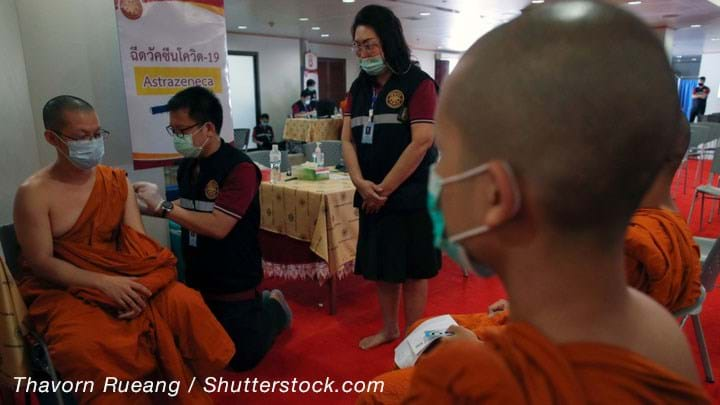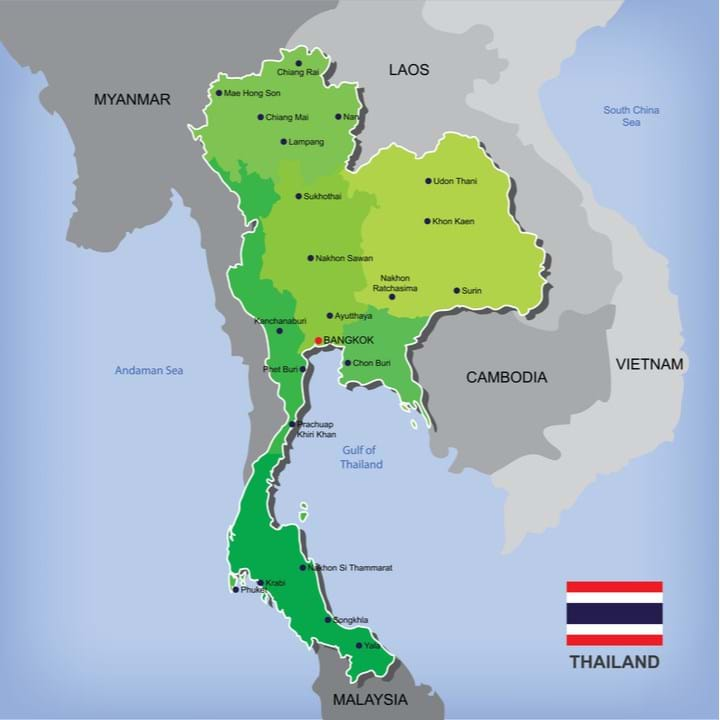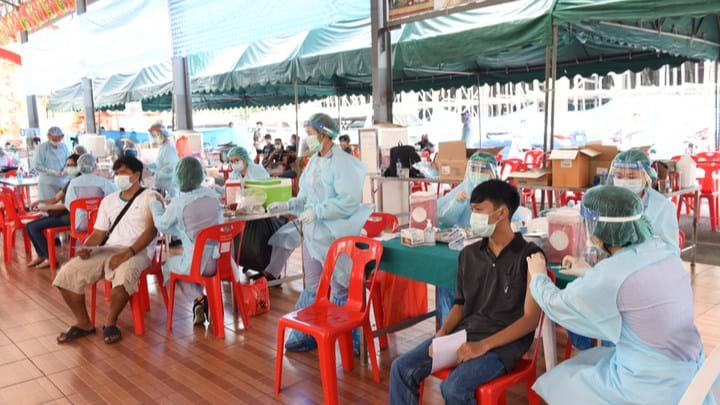Thailand: Covid-19 and the Vaccine

How the Covid-19 vaccine development is progressing in Thailand
THAILAND is a developing country in the Asean Region of SE Asia with a population of 66m and also several million migrant workers from Myanmar and Cambodia who work in the food production and construction industries. In 2019 Thailand received 35m visitors from many parts of the world to visit the spectacular beaches, mountains and temples. A dramatic consequence of the Covid-19 pandemic is that there are now no visitors, and the tourist areas are very quiet.
Thailand is also a globally-renowned wellness hub and has attracted millions of foreign patients in previous years. Its public healthcare is highly rated, and was ranked the sixth-best healthcare provider in 2019, according to analysis conducted by magazine CEOWORLD.
Thailand was the forerunner among low-middle income countries in setting a National Health Security Office (NHSO) to ensure Universal Health Coverage (UHC). This involves a national strategic policy and action plan for vaccine security, in which all Thai people should have equal access to quality vaccines.
Thailand has a National Vaccine Committee (NVC) which was established by the National Vaccine Security Act 2018. It is chaired by the Prime Minister and vice-chaired by the Minister of Health, and has various representatives from relevant government agencies as well as invited experts in related fields, including the Department of Disease Control (DDC). The DDC comes under the Ministry of Public Health and they are responsible for managing the Covid-19 pandemic.

Timeline
In mid-March 2020, following the outbreak of Covid-19, Thailand went into lockdown and closed its borders. In late March, the Government declared a state of emergency and set up three pillars to manage the pandemic:
- Pillar 1 is for the country to develop its own vaccines through researchers at the major Universities of Chulalokorn, Mahidol and King Monkut.
- Pillar 2 is to use the international COVAX arrangement to source vaccines. This programme which is co-led by the UN seeks to accelerate access to vaccines. The Government is now holding off on this option because the cost per shot is higher and there is uncertainty about delivery times through the COVAX arrangement.
- Pillar 3 is contracts for non-Thai providers to supply vaccines. Examples include contracts with AstraZeneca and Sinovac which are cheaper than supplies from the US.
Companies involved
There are several Thai organisations and pharmaceutical companies making very good progress on developing a vaccine for Covid-19:
Siam Bioscience (AZ vaccine)
Siam Bioscience is one of 25 companies selected by AstraZeneca to license its Covid-19 viral vector vaccine. The overall contract is for 200m doses and this is to supply Thailand, the ASEAN countries, and the Maldives.
Siam Bioscience is a biopharmaceuticals manufacturer founded in 2009 through the King’s Fund, which was set up by the Late King Rama IX to improve health and wellbeing.
AstraZeneca audited Siam Bioscience during Q2 of 2020. Nakorn Premsri, Director of the National Vaccine Institute (NVI), shared a letter with reporters detailing how the audit covered issues relating to anti-bribery, anti-corruption, supply chain security measures, human rights and financial health. It ensured Siam Bioscience was fit to obtain a license to produce the Covid-19 vaccine for the region, The Bangkok Post reported in February.
Technology transfer started in October 2020 and Siam Bioscience are now making the drug substance and the drug product. The first output is expected in mid 2021.

GPO Saraburi
In 1966, Thailand founded The Government Pharmaceutical Organization (GPO) in Bangkok. GPO is the largest pharmaceutical producer and distributor in Thailand and is a typical medium-sized (by Western standards) pharmaceutical production company in the ASEAN region.
Nowadays the company has three major sites: headquarters in the centre of Bangkok; Rangsit Pharmaceutical Production Plant 1 in the northern outskirts of Bangkok; and the Vaccine Manufacturing Factory located north of the capital in the central Saraburi province.
The vaccine facility in Saraburi has developed an egg-based Covid-19 vaccine using its well-developed influenza technology. It received assistance from Texas University through PATH, an organisation focussed on accelerating health equity. The Covid-19 vaccine consists of a Newcastle disease virus genetically modified to make a spike protein found on the surface of the SARS-CoV-2 coronavirus. This approach is important because this virus grows to high titres in eggs and the vaccine can be produced using the existing global influenza virus vaccine pipeline. Animal testing is complete and GPO announced that a Phase 1 trial would start in March.
Baiya Phytopharm
This is a Thai startup from Chulalongkorn University’s Faculty of Pharmaceutical Sciences. Its vaccine has been developed using bacteria from plant leaves and has already passed tests on laboratory animals. Human trials are planned to start in 2022.
BioNet-Asia
BioNet-Asia was founded in 2001 and has spent years developing recombinant vaccines and a DNA technology platform especially for Zika and Dengue viruses. The knowledge has enabled rapid development of a DNA-based vaccine called COVIGEN by BioNet-Asia, the University of Sydney and Melbourne-based biotech Technovalia. In March, the University of Sydney announced that Human Research Ethics Committee (HREC) has approved the phase 1 trial of COVIGEN in Australia.
GPO-MBP
The Government Pharmaceutical Organization-Merieux Biological Products Co (GPO-MBP) is a joint venture between GPO and Sanofi to make vaccines, especially children's vaccines, for the Thai population.
In the middle of last year, GPO-MBP started discussions with Sinovac about providing a large supply of vaccine but there was a conflict of interest because GPO-MBP is 49% owned by Sanofi. The contract was handed over to GPO to handle independently, which has since finalised the deal for 2m doses, and the first 20,000 doses of the Sinovac vaccine have already been delivered and administered. GPO-MBP has made available fill-finish capacity for 5m doses for immediate use by any of the companies in Thailand when they have drug substance ready for fill-finish.
Chulalongkorn University
The mRNA ChulaCOV 19 vaccine developed by Chulalongkorn University at its Chula Vaccine Research Center has had success in animal trials and will be tested on humans in Q2 2021. It is hoped that a maximum of 5m shots can be produced with its partner, vaccine manufacturer BioNet-Asia, by the end of this year.
Thai Red Cross
The Thai Red Cross has a history of vaccine manufacture going back over 30 years. The Thai Red Cross was established in 1893 and supported by the Queen Savang Vadhana. It makes BCG vaccine, both drug substance and drug product. It is the only manufacturer of this vaccine in the ASEAN region and it distributes to the Region. It also produces rabies vaccine and snake antivenoms for national distribution.
Faculty of Tropical Medicine at Mahidol University
It is also important to mention the Faculty of Tropical Medicine at Mahidol University and Professor Sir Nick White who arrived in Thailand from Oxford University 40 years ago to develop treatments for malaria and snake bites. His team at the Faculty of Tropical Medicine at Mahidol University has carried out large-scale clinical trials, notably for HIV treatments, and has been at the forefront of research into vaccines for Dengue and Zika viruses; it unravelled the genome for the Zika virus.
The current situation
As reported by The Bangkok Post on 29 April, the Government reported ten new deaths related to Covid-19 and 1,871 new cases, over the previous 24 hours. The new cases comprised 1,864 local infections and seven imported, raising the national total to 63,570 cases, with 188 deaths.
The expectation is that 50% of the population will be vaccinated by the end of 2021.
At the time of writing the Government has instigated projects under its Ministries to plan and optimise systems supporting the management of vaccination information to enable international travel and tourism.
One problem is that Thailand has an exceptionally minimal spread of Covid-19 with a very low number of cases, which means a comparison between a vaccinated group and a control group isn’t possible, so Stage 3 clinical trials for the locally-developed vaccines are planned in other countries.
The future
Even as the Covid-19 pandemic has crippled industries in other parts of the world, it has actually raised investor confidence in Thailand’s healthcare sector. In a recent example, Genexine, South Korea’s largest biotech company, has teamed up with a Thai public-private consortium to establish KinGen Biotech, a manufacturer of oncology drugs and DNA vaccines for cervical cancer.
Summary
Vaccines have a strong foundation in Thailand. Sir Nick said: “Thailand punches above its weight in clinical medical research. It has very good academic standards and has created a milieu that prizes innovation, creativity and knowledge,” The Bangkok Post reports.
This strong foundation in a healthcare system and an administration based on collective scientific foundations have proven particularly beneficial in trying to control the epidemic and boosting the economy. This foundation has enabled the impressive development of domestic vaccines and the opportunity for Thailand to help its neighbours in the region.
Acknowledgement: Thanks to Boonrak Thawornrungroaj, Managing Director of GPO-MBP, who agreed to speak to the author for this article.
This article is part of an ongoing series on Access to Medicines, developed in collaboration with IChemE’s Pharma Special Interest Group. Read the series here.
Recent Editions
Catch up on the latest news, views and jobs from The Chemical Engineer. Below are the four latest issues. View a wider selection of the archive from within the Magazine section of this site.




